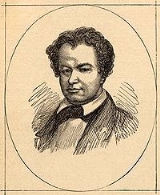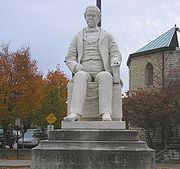
George D. Prentice
Encyclopedia
George Dennison Prentice was the editor of the Louisville Journal, which he built into a major newspaper in Louisville, Kentucky
. He attracted readers by satire as well as exaggerated reporting and support of the Know-Nothing Party in the 1850s. His writing was said to contribute to rabid anti-Catholic and anti-foreigner sentiment, and a riot in 1855. During the Civil War, he created and wrote about a fictional guerrilla "Sue Mundy
", whose activities he used to taunt the Union military commander of the state.
in 1823. Following graduation he began contributing to literary periodicals and studied law in Canterbury, Connecticut
. Although he joined the bar
in that state, he was more interested in literature. After practicing law briefly, he became editor of the Hartford New England Review in 1828.
On the strength of his political writings, he was invited to come to Kentucky to write a campaign biography of Henry Clay
, which sold 20,000 copies. Prentice received no money for this work because the publisher went bankrupt. He stayed in Louisville and accepted an offer to co-found the Louisville Journal newspaper in 1830, with the goal of rivaling the then-dominant Louisville Public Advertiser. Prentice soon found himself in an editorial feud with Advertiser publisher Shadrack Penn, which continued until Penn left the city in 1841.
The Journal quickly became popular in Louisville, largely because of Prentice's biting editorials and the savage wit of his replies to detractors. Prentice was a dedicated backer of the Whig Party
. In the 1850s, Prentice editorialized in support of the Know-Nothing party and the pro-slavery, anti-Catholic and anti-foreigner movement that reached a hysterical level in the 1850s in many parts of the nation.
In Louisville this culminated in the Bloody Monday
riot of 1855, in which 22 people were killed. Just days before the riots, which occurred as mobs tried to prevent Irish and German citizens from voting on election day, Prentice had editorialized against the "most pestilent influence of the foreign swarms" loyal to a pope
he called "an inflated Italian despot who keeps people kissing his toes all day." According to Archbishop John Lancaster Spalding, Prentice later publicly expressed regret over his role in the riots.
Prentice supported the Union in the 1850s, but disagreed with many of its policies during the Civil War
. In 1861 he joined a group that urged Kentucky not to secede from the Union but establish itself as a neutral party in the war. In 1864 he created the famous "Sue Mundy
" guerrilla character to mock the incompetence of Union General Stephen G. Burbridge
, military commander of Kentucky.
After the war Prentice opposed many of the policies of Reconstruction. His paper was one of the few that criticized federal rebuilding policies of the time. Prentice remained as editor of the paper during and after the 1868 merger that created The Courier-Journal
.
He died of influenza and was buried in Cave Hill Cemetery.
 His legacy is generally unfavorable, with an editor from his own paper calling Prentice's writings "raw bigotry" in a 1993 feature on the history of the newspaper. A statue of Prentice by Alex Bouly, was completed in 1875. It was originally displayed at the Courier-Journal building in Louisville, Kentucky, but was moved in 1914 to its present location in front of the Louisville Free Public Library
His legacy is generally unfavorable, with an editor from his own paper calling Prentice's writings "raw bigotry" in a 1993 feature on the history of the newspaper. A statue of Prentice by Alex Bouly, was completed in 1875. It was originally displayed at the Courier-Journal building in Louisville, Kentucky, but was moved in 1914 to its present location in front of the Louisville Free Public Library
's main branch. It has been a source of occasional controversy, due to Prentice's famous anti-Catholic and anti-immigrant rhetoric. A compromise reached at one point involved the city placing a new plaque for the statue, describing Prentice's "tarnished legacy".
A Liberty ship
, the SS George D. Prentice, was launched in 1943 and remained in service until 1969.
Louisville, Kentucky
Louisville is the largest city in the U.S. state of Kentucky, and the county seat of Jefferson County. Since 2003, the city's borders have been coterminous with those of the county because of a city-county merger. The city's population at the 2010 census was 741,096...
. He attracted readers by satire as well as exaggerated reporting and support of the Know-Nothing Party in the 1850s. His writing was said to contribute to rabid anti-Catholic and anti-foreigner sentiment, and a riot in 1855. During the Civil War, he created and wrote about a fictional guerrilla "Sue Mundy
Sue Mundy
Sue Mundy was a fictional guerrilla character created by George D. Prentice, the editor of the Louisville Journal, who opposed the heavy-handed military rule of General Stephen G. Burbridge in Kentucky during the American Civil War.-History:...
", whose activities he used to taunt the Union military commander of the state.
Biography
The son of a farmer, Prentice excelled in school and graduated from Brown UniversityBrown University
Brown University is a private, Ivy League university located in Providence, Rhode Island, United States. Founded in 1764 prior to American independence from the British Empire as the College in the English Colony of Rhode Island and Providence Plantations early in the reign of King George III ,...
in 1823. Following graduation he began contributing to literary periodicals and studied law in Canterbury, Connecticut
Canterbury, Connecticut
Canterbury is a town in Windham County, Connecticut, United States. The population was 4,692 at the 2000 census.-History:The area was first settled in the 1680s as Peagscomsuck, consisting mainly of land north of Norwich, south of New Roxbury, Massachusetts and west of the Quinebaug River and the...
. Although he joined the bar
Bar association
A bar association is a professional body of lawyers. Some bar associations are responsible for the regulation of the legal profession in their jurisdiction; others are professional organizations dedicated to serving their members; in many cases, they are both...
in that state, he was more interested in literature. After practicing law briefly, he became editor of the Hartford New England Review in 1828.
On the strength of his political writings, he was invited to come to Kentucky to write a campaign biography of Henry Clay
Henry Clay
Henry Clay, Sr. , was a lawyer, politician and skilled orator who represented Kentucky separately in both the Senate and in the House of Representatives...
, which sold 20,000 copies. Prentice received no money for this work because the publisher went bankrupt. He stayed in Louisville and accepted an offer to co-found the Louisville Journal newspaper in 1830, with the goal of rivaling the then-dominant Louisville Public Advertiser. Prentice soon found himself in an editorial feud with Advertiser publisher Shadrack Penn, which continued until Penn left the city in 1841.
The Journal quickly became popular in Louisville, largely because of Prentice's biting editorials and the savage wit of his replies to detractors. Prentice was a dedicated backer of the Whig Party
Whig Party (United States)
The Whig Party was a political party of the United States during the era of Jacksonian democracy. Considered integral to the Second Party System and operating from the early 1830s to the mid-1850s, the party was formed in opposition to the policies of President Andrew Jackson and his Democratic...
. In the 1850s, Prentice editorialized in support of the Know-Nothing party and the pro-slavery, anti-Catholic and anti-foreigner movement that reached a hysterical level in the 1850s in many parts of the nation.
In Louisville this culminated in the Bloody Monday
Bloody Monday
Bloody Monday was the name given the election riots of August 6, 1855, in Louisville, Kentucky. These riots grew out of the bitter rivalry between the Democrats and supporters of the Know-Nothing Party. Rumors were started that foreigners and Catholics had interfered with the process of voting...
riot of 1855, in which 22 people were killed. Just days before the riots, which occurred as mobs tried to prevent Irish and German citizens from voting on election day, Prentice had editorialized against the "most pestilent influence of the foreign swarms" loyal to a pope
Pope
The Pope is the Bishop of Rome, a position that makes him the leader of the worldwide Catholic Church . In the Catholic Church, the Pope is regarded as the successor of Saint Peter, the Apostle...
he called "an inflated Italian despot who keeps people kissing his toes all day." According to Archbishop John Lancaster Spalding, Prentice later publicly expressed regret over his role in the riots.
Prentice supported the Union in the 1850s, but disagreed with many of its policies during the Civil War
American Civil War
The American Civil War was a civil war fought in the United States of America. In response to the election of Abraham Lincoln as President of the United States, 11 southern slave states declared their secession from the United States and formed the Confederate States of America ; the other 25...
. In 1861 he joined a group that urged Kentucky not to secede from the Union but establish itself as a neutral party in the war. In 1864 he created the famous "Sue Mundy
Sue Mundy
Sue Mundy was a fictional guerrilla character created by George D. Prentice, the editor of the Louisville Journal, who opposed the heavy-handed military rule of General Stephen G. Burbridge in Kentucky during the American Civil War.-History:...
" guerrilla character to mock the incompetence of Union General Stephen G. Burbridge
Stephen G. Burbridge
-External links:* — Article by Civil War historian/author Bryan S. Bush...
, military commander of Kentucky.
After the war Prentice opposed many of the policies of Reconstruction. His paper was one of the few that criticized federal rebuilding policies of the time. Prentice remained as editor of the paper during and after the 1868 merger that created The Courier-Journal
The Courier-Journal
The Courier-Journal, locally called "The C-J", is the main newspaper for the city of Louisville, Kentucky, USA. According to the 1999 Editor & Publisher International Yearbook, the paper is the 48th largest daily paper in the United States and the single largest in Kentucky.- Origins :The...
.
He died of influenza and was buried in Cave Hill Cemetery.
Legacy

Louisville Free Public Library
The Louisville Free Public Library is the largest public library system in Kentucky. Officially opened in 1908, the library's main site resides south of Broadway in downtown Louisville. Additional branches were added over time, including the Western Colored Branch, which was the first...
's main branch. It has been a source of occasional controversy, due to Prentice's famous anti-Catholic and anti-immigrant rhetoric. A compromise reached at one point involved the city placing a new plaque for the statue, describing Prentice's "tarnished legacy".
A Liberty ship
Liberty ship
Liberty ships were cargo ships built in the United States during World War II. Though British in conception, they were adapted by the U.S. as they were cheap and quick to build, and came to symbolize U.S. wartime industrial output. Based on vessels ordered by Britain to replace ships torpedoed by...
, the SS George D. Prentice, was launched in 1943 and remained in service until 1969.

